Laboratory gives the first hands on experience for an engineering graduate and helps to gain practical exposure of the theoretical knowledge and skills. Laboratories are critical for innovation in various fields. They provide a space where new ideas can be tested and refined, leading to new discoveries and breakthroughs. In department of ECE, we have state of art laboratories fully equipped with latest software and modern tools. These labs facilitate the real-world applications of the theoretical concepts discussed in the classroom. These laboratories play a crucial role in the all-round development of students as well as faculty members.
List of Laboratories
-
Communications Laboratory
-
Devices and Digital IC Laboratory
-
Analog and Linear Electronic Circuit Laboratory
-
Microwave and Optical Communication Laboratory
-
Printed Circuit Board (PCB) Design Laboratory
-
Processor Laboratory
-
VLSI Design Laboratory
-
Network Simulation and DSP Laboratory
Communications Laboratory
The communications laboratory is one of the most important laboratories for students of Electronics and Communications Engineering. It provides the hands-on experience to handle and perform practical experiments in the field of Analog and Digital Communication engineering. This laboratory provides an opportunity for the student to gain knowledge and practical exposure of various communications test equipment and measurement techniques.
This laboratory focuses on training students in both analog and digital transmission and reception of signals. Students are provided at this laboratory with such learning experiences that enable them to carry out various types of modulation/demodulation experiments and learn through lectures, lab hands on and out-of-class assignments etc. In this lab students are able to analyze analog/digital modulation techniques by using MATLAB tools. The gain knowledge to identify and describe different techniques in modern digital communications, in particular in source coding using MAT Lab tools.
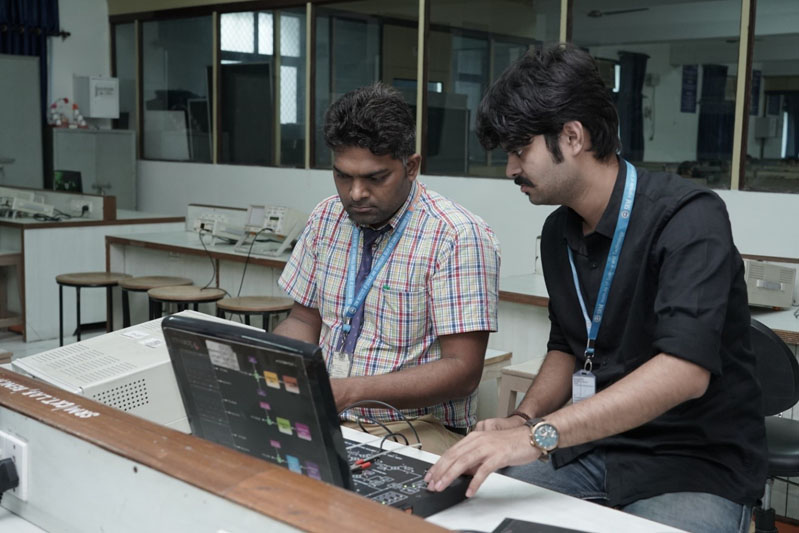
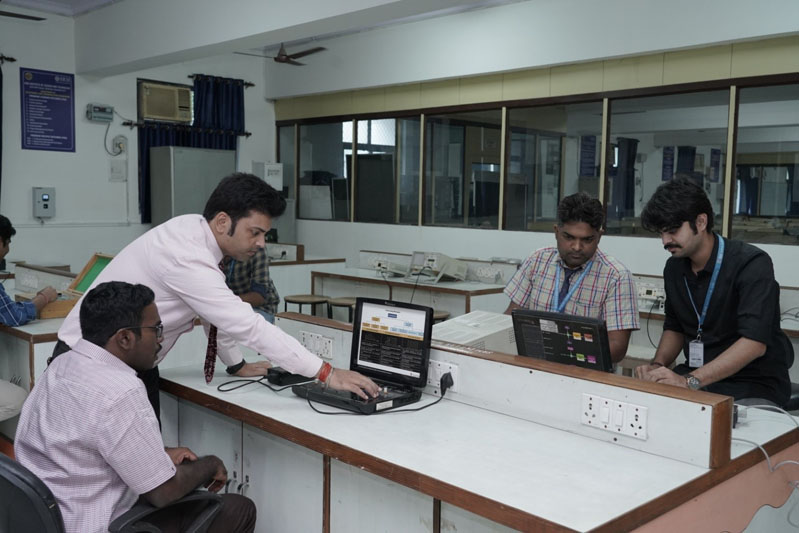
-
Amplitude modulation & DemodulationKit
-
Frequency Modulation & Demodulation Kit
-
PAM/PWM/PPM Modulation & Demodulation Kit
-
ASK/PSK/FSK/DPSK/QPSK Modulation &Demodulation Kit
-
Data formatting and re-formatting Kit
-
Pre-emphasis and De-emphasis Kit
-
Time Division Multiplexer& Demultiplxer Kit
-
Frequency Division Multiplexer& Demultiplxer Kit
-
PCM/DPCM Modulation &Demodulation Kit
-
Delta Adaptive Modulation & Demodulation Kit
-
Sampling Construction & Reconstruction Kit
-
Function Generator
-
Variable Binary Data Generator
-
Cathode Ray Oscilloscope(20mhz,30mhz)
-
Digital Storage Oscilloscope(50mhz)
Lab In-charge:
-
Dr. Saptarishi Gupta (Associate Professor)
-
Mr. Nishant Srivastava (Assistant Professor)
Devices and Digital IC Laboratory
This laboratory provides hands-on experience to the student by examining the characteristics of various semiconductor devices such as diodes, BJTs and FETs. It also provides them with the knowledge and capability to use simulation tools to perform various analyses of semiconductor devices. This knowledge dissemination is achieved through an emphasis on troubleshooting, designing and simulating realistic circuit faults. This laboratory trains the learners to suitably design and analyzes the operations of discrete electronic circuits to understand their functionality. The lab facilitates the characterization of various electronic devices such as diode, BJT, FET, MOSFET etc. and also demonstrates the design and analysis of various electronic circuits such as amplifiers using BJT, FET, MOSFET and RC, LC oscillators. The laboratory also trains students for tool based analysis and simulation using OPCAD capture PSpice software.
The lab also provides a general understanding of digital fundamentals and an opportunity to enhance their knowledge of digital electronics. The laboratory achieves this by emphasizing the study on number systems, Boolean algebra, logic families, medium-scale integration (MSI) and large-scale integration (LSI) circuits, analog to digital (AD) and digital to analog (DA) conversion, and other such related topics. The Laboratory is fully equipped with latest instruments like C.R.O., Multimeters, Function Generators, IC Tester etc. to conduct experiments with digital ICs for UG students. The lab also facilitates use of software tool e.g. LOGISIM to design and simulate various combinational and sequential circuits.
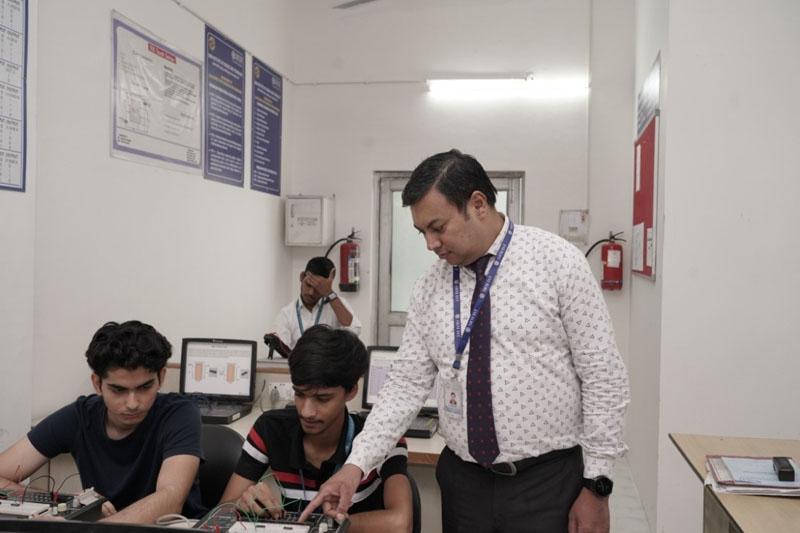
Major Equipments:
-
CRO
-
Function Generator
-
DC Regulated Power Supply
-
Digital Trainer Kits
-
IC Tester
Lab In-charge:
-
Mr. Amit (Assistant Professor)
-
Mr. Abhishek Chauhan (Assistant Professor)
Analog and Linear Electronics Circuit Laboratory
LIC lab aims to train the students in designing the linear integrated circuits using operational amplifiers, 555 timers and OTA (Operational Trans-conductance Amplifiers). In this lab, students understand the basics of linear integrated circuits and acquire the basic knowledge of particular IC function. This lab helps the students to design and analyze various configurations of OPAMP circuits such as summing amplifiers, comparators, log-antilog amplifiers, sinusoidal and non-sinusoidal oscillators, phase lock loops, and many more. This lab enhances the designing and problem solving capabilities of student. The lab also trains students to work with ORCAD capture PSpice tool to simulate various OPAMP based electronic circuit.
Major Equipments:
-
CRO
-
Function Generator
-
DC Regulated Power Supply
-
ADC Kits
-
DAC Kits
Lab In-charge:
-
Dr. Abhishek Singhal (Assistant Professor)
Microwave and Optical Communication Lab
The objective of this laboratory course is to design and analyze the characterization of RF, Microwave and Optical Communication components. The facilities in this lab allow students to perform the experiments pertaining to the study of optical fiber communication using state of the art kits. This lab is equipped to carry out basic microwave measurements, such as Impedance, Power, Frequency, VSWR etc. using waveguide technology. In addition to this, the lab also provides the necessary equipment for the students to perform their projects using Microwave Integrated Circuits, Microstrip Antenna etc. This laboratory also allows a study of optical communications dealing in the characteristics of the optical fibers, sources and detectors, setting up of analog and digital fiber links using LED and LASER sources, and more.
Current Facility in Lab:
The Microwave Lab is well equipped with all the required equipments like Klystron power supplies, Microwave trainer kits, Directional Couplers, Klystron test benches – X band 8.2 to 12.4 Ghz, Gunn diode set ups, VSWR meters, RF circuit design trainer, and Digital Storage Oscilloscopes (DSO) etc.
Microwave integrated circuits, micro strip antenna enables the students to do the projects in this field through analysis and design of their own antennas. A new compact range antenna characterizing facility has been set up to measure the radiation characteristics of antennas especially the patch antennas and active phased array antennas.
The department provides an in-depth knowledge on advanced optical communication. The lab in fiber optics provides the student with an experience on the various fiber optic and digital communication techniques.
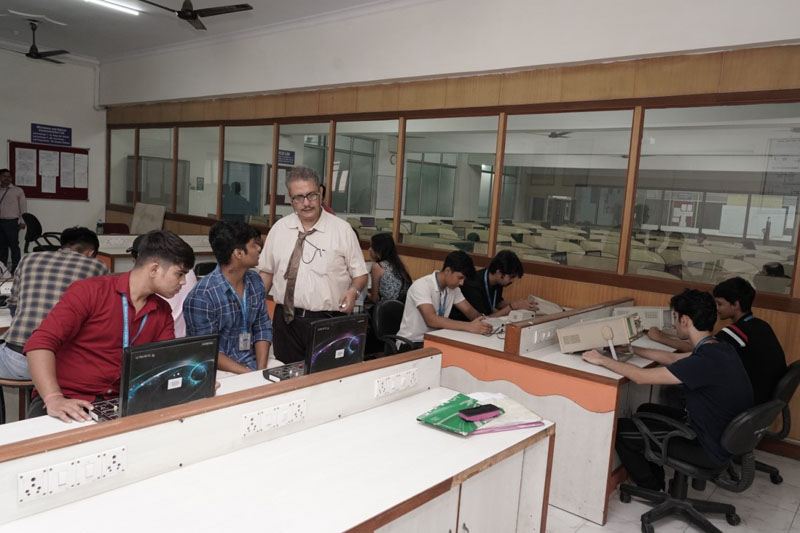
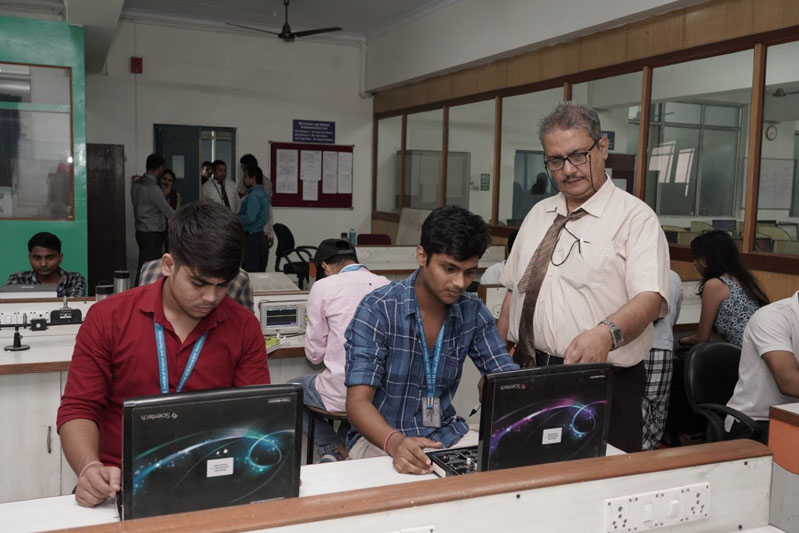
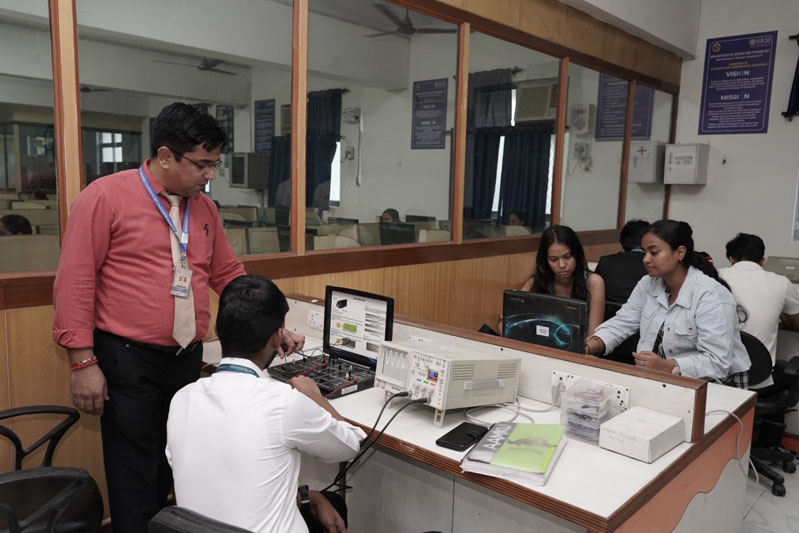
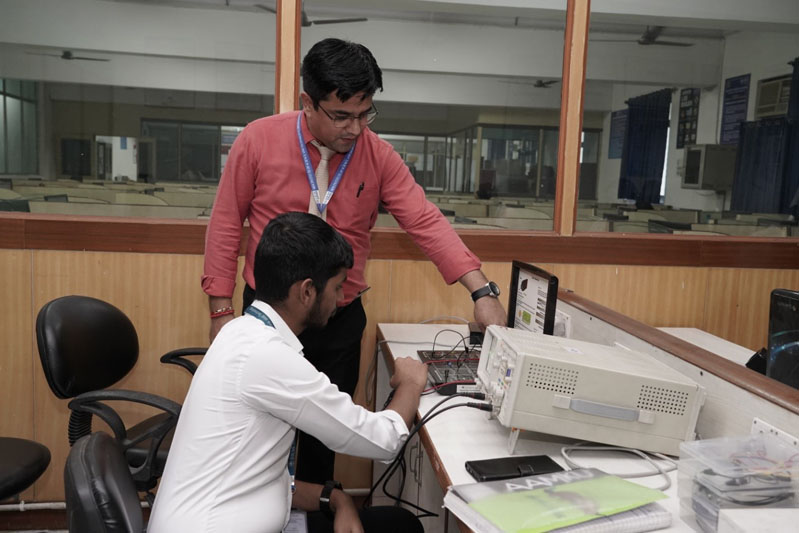
Major Equipment List:
|
Reflex Klystron Setup |
Band 8.2–12.4 GHz |
|
Gunn Diode Setup |
X Band 8.2–12.4 GHz |
|
Horn Antenna Setup |
Band 8.2–12.4 GHz |
|
Micro Strip Antenna Trainer |
4 – 6 GHz |
|
CRO |
30 MHz |
|
CRO |
100 MHz |
|
DSO |
100 MHz |
|
Fiber Optic Analog Trainer Kits |
|
Trainer Kit of LASER Diode |
|
Microwave Components: Directional Coupler, E-Plane Tees, H-Plane Tees, Magic Tees Circulators, Isolator ,Matched Loads etc. |
Lab Incharges:
-
Dr. Satya Sai Srikant (Professor)
-
Mr. Arun Kumar (Assistant Professor)
Printed Circuit Board (PCB) Design Laboratory
The PCB is widely used in fabrication of electronics as well as electrical circuits since it provides a platform for the connections of various components used in the circuit. The PCB laboratoryis used to design customized PCB of different electronic circuits. In this lab both single side and double side PCBs can be fabricated.
This laboratory facilitates the design of different PCB’s for their minor and major project works, perform circuit simulations, extract layout from software and print the circuit boards designed using the provided hardware. The Cadence – OrcadPspice software is used by the students at this laboratory as of today while we keep a sharp lookout for any new software being used by the industry. The laboratory not only facilitates the PCB design but can also be used for the fabrication of patch antennas of any dimensions enabling the research work. All the processes of fabrication including printing, etching, shearing, drilling, tinning etc. can be carried out in the lab.
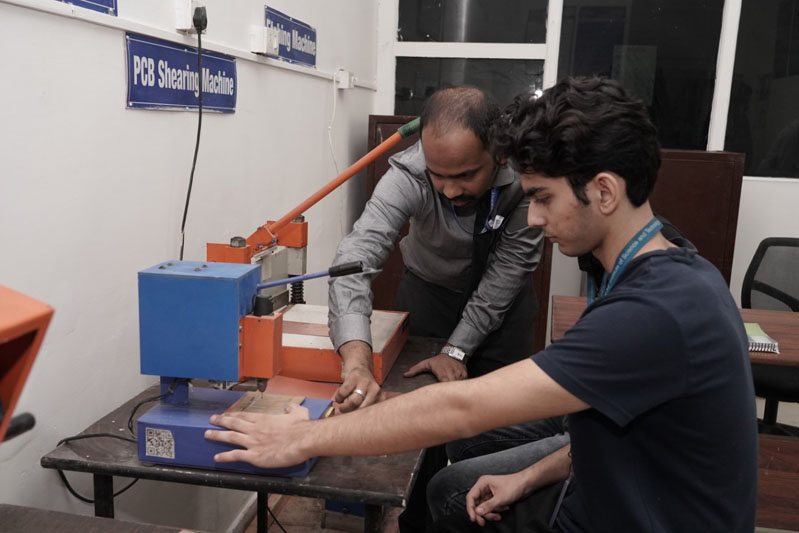
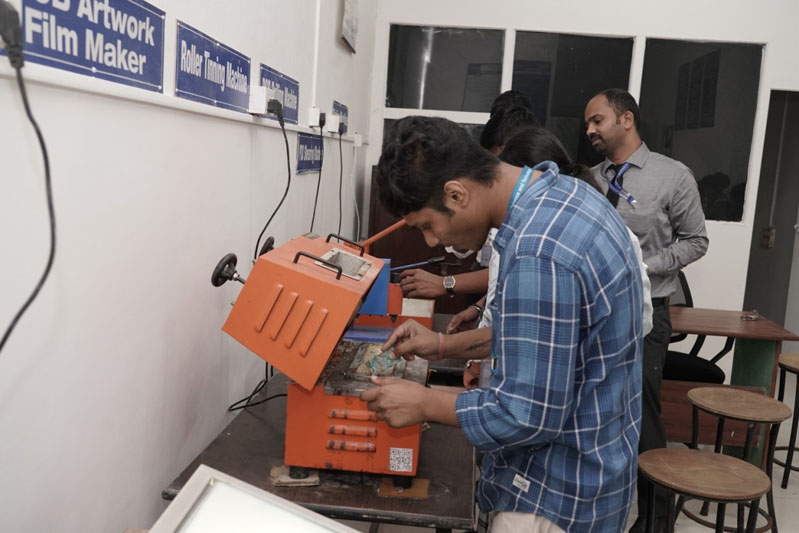
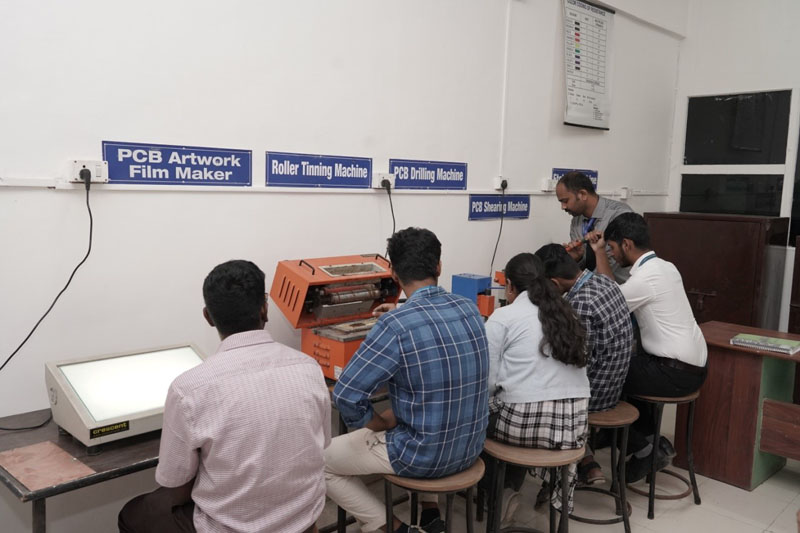
|
Major hardware components are: |
Specification |
|
PCB Shearing Machine, |
Overall dimension-460*330*350mm, PCB size-255*305mm |
|
PCB Drilling Machine |
Overall dimension-20mm*170mm*270mm,
Range of collet chuck 0.6- 3mm,
Dimension of table-280*170mm, depth 30mm,
Spindle speed 1000-20,000rpm |
|
Roller tinning Machine, |
Maximum Board width-250mm(10"),Thickness- 5mm
Solder Capacity-5kgs,Heaters-2*500watts,
power-230v Ac 50Hz. |
|
PCB artwork filmmaker |
Overall dimension-380*230*330mm,
Electrical Supply-230v 50hz,
Effectiveiiluminated area-10*12"(250*300mm) |
|
Illuminated artwork table |
Effective illuminated area-12*16(305*405mm)
20*24-(500*610mm),14*18-(355*455mm)
Power-230v,50hz,AC supply |
|
Etching Machine, |
Overall dimension -550*170*500,
PCB size- 10" *12"(255*305mm),
Capacity-20litres,Timer (0-4min) |
|
Dye/Developer |
Capacity of each tank is 2 litre. |
|
Photo resist DIP coating machine |
Overall dimension-355*380*850mm,
Panel size-254*305mm,power-230v,50hz |
|
PCB Curing Machine(oven) |
Overall dimension -550mm*120mm*500mm,
PCB Size-250mm*300mm(10"*12"),Timer(0-5min)
Power-500watts,Mains operation-230volts |
Lab In-charges:
-
Dr. M.Vinoth Kumar (Assistant Professor)
Processor Laboratory
This laboratory provides intensive practical exposure to the students in the field of ARM Microprocessor, 8086 Microprocessor, 8051 Microcontrollers and various interfacing techniques. This laboratory courseis designed to enhance the programming skills of students using assembly language through hardware interface. It also provides hands on experienceof interfacing techniques for peripheral devices like A/D converters, stepper motors, DC motors, temperature controllers, USART, interrupt controllers and many more.It enables Serial Data Communication between PC, microprocessors and microcontroller trainer kits and writing on EPROM or microcontroller chip using UIP. The equipment available includes advanced processor kits including ARM microprocessor NXP OMT boards and arduinouno. The facilities available in this Laboratory helps the students to make their projects and enhance their Knowledge on the latest trends in the field of embedded systems.It is a multi-disciplinary lab available for students to develop their skills in the field of Microprocessors, Microcontrollers and Embedded Systems with their applications.
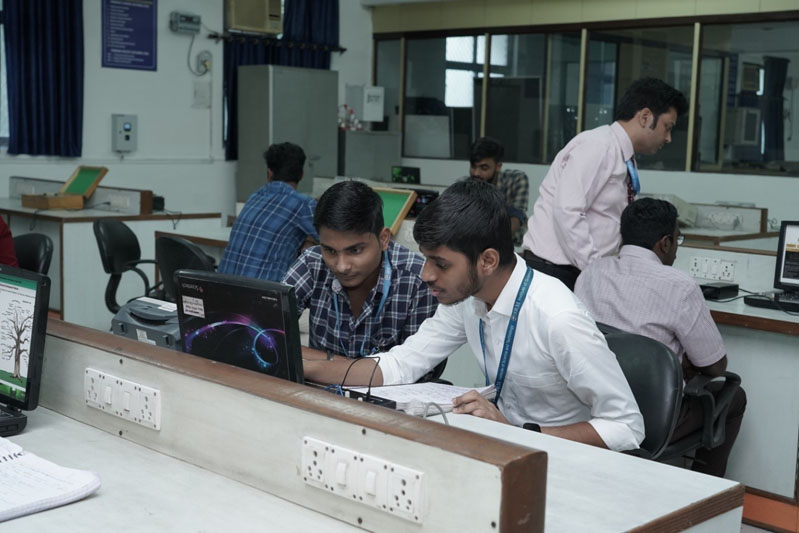
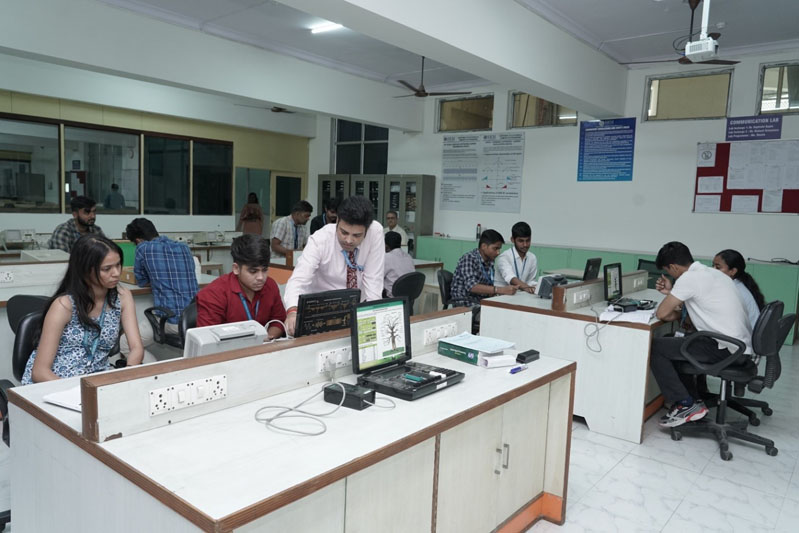
Major Equipment:
-
ARM Microprocessor NU-LB –NUC140 (NUVOTON) Kit
-
ARM Microprocessor NXP OMT 1043 LPC 1768 microcontroller development Board.
-
Microprocessor kits (8086)
-
Microprocessor kits (8085)
-
Microcontroller kits (8051)
-
Arduino Uno
Interfacing boards:
-
PPI(8255)
-
DMA Controller (8257)
-
Interrupt controller (8259)
-
Timer (8253)
-
ADC
-
DAC
-
Serial Communication (USART 8251),
-
Stepper motor
-
Traffic controller card
Software
-
EMU 8086 Simulator and Emulator IDE
Lab In-charges:
-
Dr. Minakshi Sanadhya (Assistant Professor)
-
Ms. Ghazala Ansari (Assistant Professor)
VLSI Design Laboratory
The VLSI laboratory is utilized to train undergraduate and postgraduate students in digital and analog front end design. The VLSI laboratory has 31 high-end systems fully equipped with the required licensed software and five Xilinx Spartan 3E FPGA Boards for students.
The students and PhD scholars utilize this laboratory for their project work using high end tools such as XILINX ISE 9.2i, ModelSim Altera 6.3g, ORCAD Suite, Ansoft’s HFSS, Vivado HDL Design Suite, MATLAB 7.4, EMU 8086 Simulator and Emulator IDE. Students use various programming languages, such as VHDL, Verilog, etc. for coursework and project work. Various projects based on front end VLSI design, electronic circuit design through PSpice ORCAD tool, antenna design through HFSS could be carried out in this lab.
Software:
-
Xilinx ISE 9.2i Series
-
ModelSim Altera 6.3g
-
ORCAD Suite
-
Ansoft’s HFSS
-
Vivado HDL Design Suite
-
EMU 8086 Simulator & Emulator IDE
Hardware:
Lab Incharges:
-
Dr. Aditya Agarwal (Assistant Professor)
Network Simulation and DSP Laboratory
The DSP laboratory is utilized to train undergraduate and postgraduate students with Digital Signal Processing Techniques using DSP Processor kits and software. The DSP laboratory has 31 high-end systems fully equipped with the required licensed software & TMS 320C6713 DSP PROCESSOR or DSP5416 Starter kit.
The laboratory is equipped with high end tools such as MATLAB 7.4 and NETSIM software. The experiments related to computer network communication can be performed to study various computer communication protocols and routing techniques.
Hardware:
-
TMS 320C6713 DSP PROCESSOR
-
DSP5416 Starter kit
Lab Incharges:
-
Dr. Nitin Kumar (Associate Professor)
-
Mr. Devasis Haldar (Assistant Professor)
